Module 11 unit 3 Language in use 课件(共29张PPT)
文档属性
| 名称 | Module 11 unit 3 Language in use 课件(共29张PPT) |
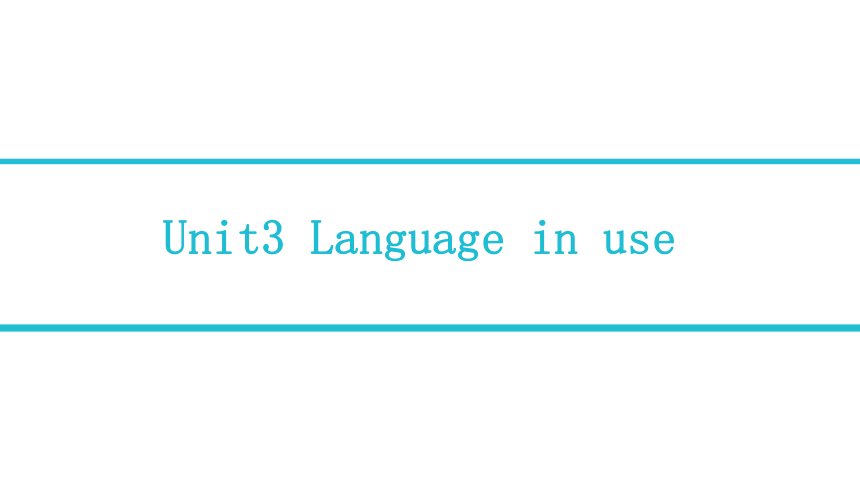
|
|
| 格式 | pptx | ||
| 文件大小 | 737.7KB | ||
| 资源类型 | 教案 | ||
| 版本资源 | 外研版 | ||
| 科目 | 英语 | ||
| 更新时间 | 2022-05-25 09:22:28 | ||
图片预览

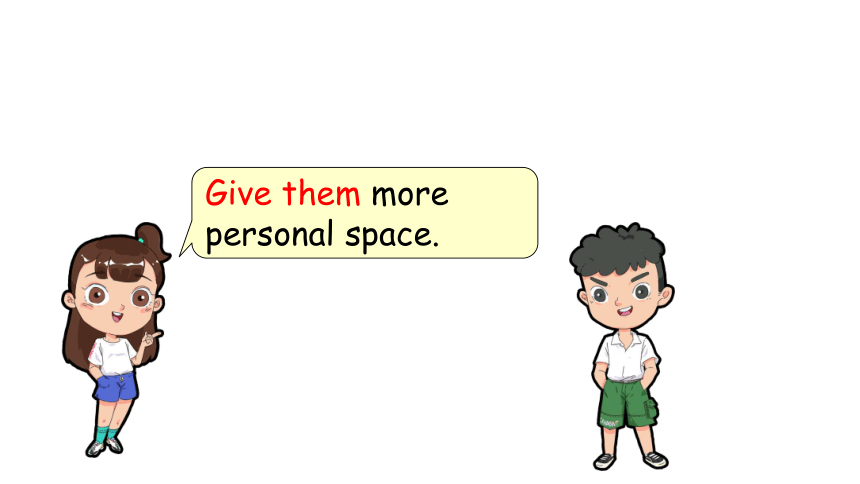
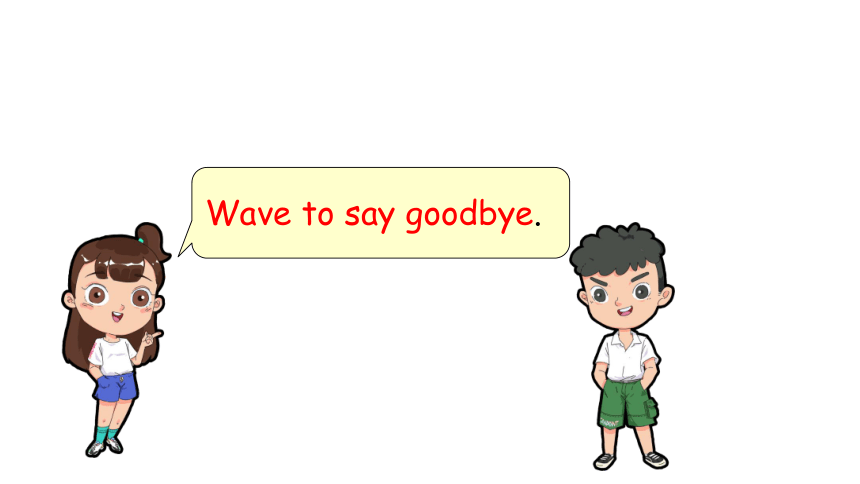
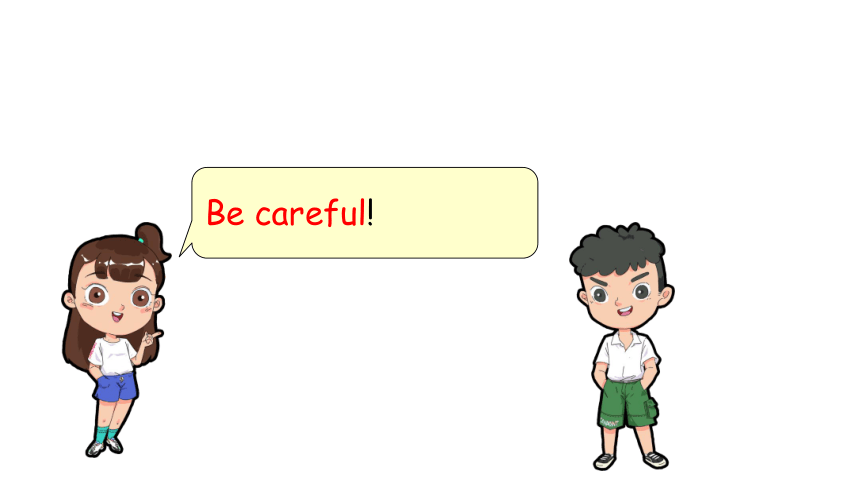
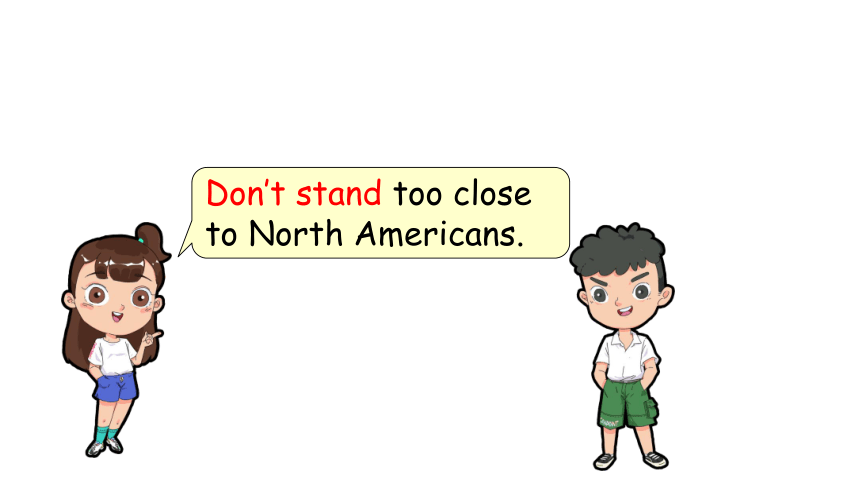
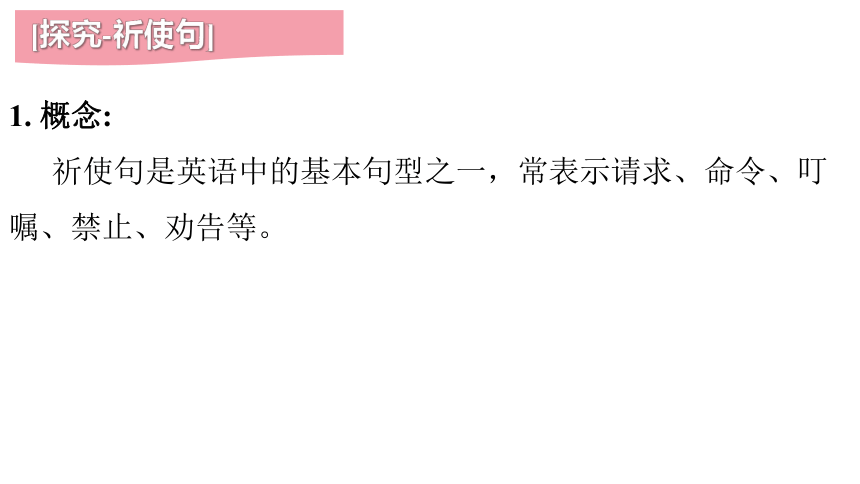
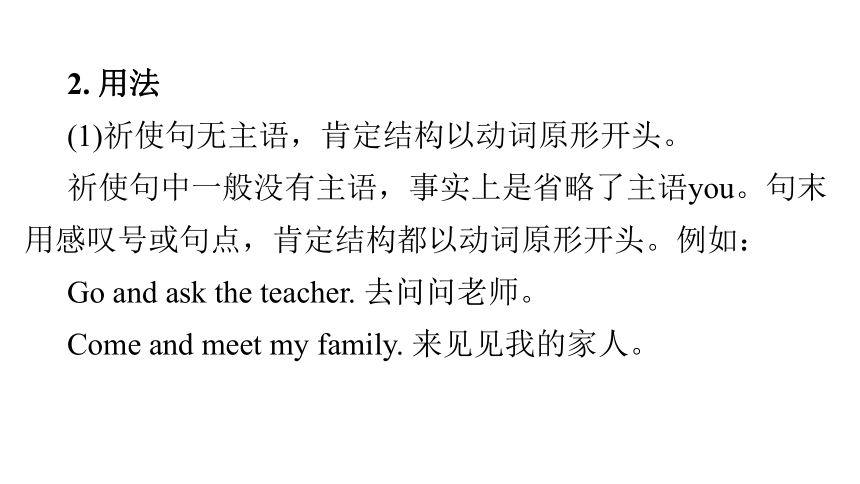
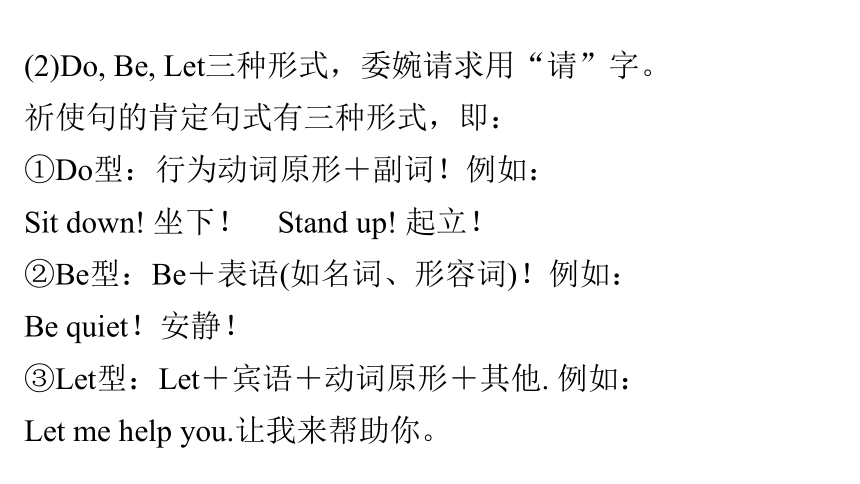

文档简介
(共28张PPT)
Unit3 Language in use
Give them more personal space.
Wave to say goodbye.
Be careful!
Don’t stand too close to North Americans.
[探究-祈使句]
1. 概念:
祈使句是英语中的基本句型之一,常表示请求、命令、叮嘱、禁止、劝告等。
2. 用法
(1)祈使句无主语,肯定结构以动词原形开头。
祈使句中一般没有主语,事实上是省略了主语you。句末用感叹号或句点,肯定结构都以动词原形开头。例如:
Go and ask the teacher. 去问问老师。
Come and meet my family. 来见见我的家人。
(2)Do, Be, Let三种形式,委婉请求用“请”字。
祈使句的肯定句式有三种形式,即:
①Do型:行为动词原形+副词!例如:
Sit down! 坐下! Stand up! 起立!
②Be型:Be+表语(如名词、形容词)!例如:
Be quiet!安静!
③Let型:Let+宾语+动词原形+其他. 例如:
Let me help you.让我来帮助你。
[注意] 三种句型中Do型是最常见、最简单的一种结构。表示请求、劝告的祈使句还常常在句首或句末加上please, 以使语气更加缓和或客气,即:“Please…”或“…, please.”例如:
Come here, please. 请来这儿。
Please look after your little sister.
请照顾你的小妹妹。
(3)祈使句的否定结构是“Don’t+动词原形+其他.”例如:
Don’t go there, please. 请别去那儿。
Don’t be late. 不要迟到。
[注意] Let’s型祈使句,其否定形式为“Let’s not…”。 例如:
Let’s not have a rest. 咱们别休息了。
3. 特点
(1)祈使句一般没有主语,说话的对象是第二人称“你”或“你们”,所以可以理解为省略了主语you;
(2)肯定结构以动词原形开头,无时态和数的变化;
(3)祈使句的否定形式是在动词原形前加don’t;
(4)在表达请求时,可以加上please;表达比较强烈的语气时,句末可以用感叹号。
1
Work in pairs. Talk about do's and don'ts in a foreign country.
Do’s Don’ts
Britain Stand in line. Shake hands. Say “please” and “thank you”. Open doors for others. Look at people when you talk. Be on time. Touch people.
Ask a woman’s age.
Stand too close.
Say anything too personal.
2
Make a list of do’s and don’ts to help visitors to Britain.
Stand in line.
Don’t touch people when you talk to them.
…
3
Rewrite the sentences.
It’s important to listen to the teacher.
Listen to the teacher.
You cannot shout in the classroom.
Don’t shout in the classroom.
1.It’s important to be careful.
Be careful.
2. It’s important to clean and tidy the lab.
Clean and tidy the lab.
3. You cannot touch anything if the teacher doesn’t ask you to.
Don’t touch anything if the teacher doesn’t ask you to.
4. You cannot bring food or drink into the lab.
Don’t bring food or drink into the lab.
5. You cannot enter the lab alone.
Don’t enter the lab alone.
4
Answer the questions. Use the words and expressions from the box to help you.
all right arm in arm close different hold on to
kiss three times point at shake hands with wave
1. How do the British say hello to each other when they first meet
They shake hands.
2. Does body language mean the same thing in different countries
No, it means different things in different countries.
all right arm in arm close different hold on to
kiss three times point at shake hands with wave
3. How do the Russians say hello to each other when they meet
They kiss three times.
4. Is it polite to stand close to North Americans
No, it is not polite to stand close to North Americans.
all right arm in arm close different hold on to
kiss three times point at shake hands with wave
5. Is it all right to wave goodbye in Greece
No, it is not all right to wave goodbye in Greece.
6. How do you usually say goodbye with body language
I usually wave.
Exercise
Ⅰ.用所给单词的适当形式填空
1.It’s an important meeting. ________ (not be) late.
2.___________ (not speak) with your mouth full of food and ________ (be) polite.
3. ____________ (not smoke) here, Rick.
Don’t be
Don’t speak
be
Don’t smoke
4.________ (not let) the baby cry.
5.Let’s ________ (not say) anything about it.
6.________ (be) careful! There is a big dog in front of you.
Don’t let
not say
Be
Ⅱ.单项填空
( )1.2018·昆明 ________ to turn off all the lights when you go out.
A.Remember B.To remember C.Remembering
( )2.Tommy, ________ play basketball in the street next time. You may get hit by a car.
A.do B.don’t C.must D.mustn’t
A
B
( )3.2018·重庆 ________ me a chance and I'll bring you a surprise.
A.Give B.Giving C.Gives D.To give
( )4.2019·青海 ________ on the grass. It’s a rule(规则) of the park.
A.Step B.Don’t step C.To step
A
B
( )5.2019·呼和浩特 ________ me an email before you come to Hohhot, and I’ll meet you at the train station.
A.Send B.Sending
C.To send D.Sent
A
Ⅲ.按要求完成下列各题
1.Look at people when you talk.(改为否定句)
________ ________ at people when you talk.
2.You can't bring anything to the lab.(改为祈使句)
Please ________ bring ________ to the lab.
Don’t look
don’t anything
3.You should be polite to the teachers at school.(改为祈使句)
________ polite to the teachers at school.
4.No talking in the hall.(改为同义句)
________ ________ in the hall.
Don’t talk
Be
In Japan, people bow to say “thank you”, “sorry”, “ hello”, “goodbye”, “you’re welcome”, “excuse me” and many other things. Children and young people bow lower when they greet older people. It’s a way of being polite and showing respect.
Around the world
The Japanese bow
Answer the questions.
1. Do people bow to say “thank you”, “sorry”, “ hello”, “goodbye”, “you’re welcome”, “excuse me” and many other things
Yes, they do.
2. Who bows lower when a young man meets an old man in Japan
The young man.
GOOD JOB
Unit3 Language in use
Give them more personal space.
Wave to say goodbye.
Be careful!
Don’t stand too close to North Americans.
[探究-祈使句]
1. 概念:
祈使句是英语中的基本句型之一,常表示请求、命令、叮嘱、禁止、劝告等。
2. 用法
(1)祈使句无主语,肯定结构以动词原形开头。
祈使句中一般没有主语,事实上是省略了主语you。句末用感叹号或句点,肯定结构都以动词原形开头。例如:
Go and ask the teacher. 去问问老师。
Come and meet my family. 来见见我的家人。
(2)Do, Be, Let三种形式,委婉请求用“请”字。
祈使句的肯定句式有三种形式,即:
①Do型:行为动词原形+副词!例如:
Sit down! 坐下! Stand up! 起立!
②Be型:Be+表语(如名词、形容词)!例如:
Be quiet!安静!
③Let型:Let+宾语+动词原形+其他. 例如:
Let me help you.让我来帮助你。
[注意] 三种句型中Do型是最常见、最简单的一种结构。表示请求、劝告的祈使句还常常在句首或句末加上please, 以使语气更加缓和或客气,即:“Please…”或“…, please.”例如:
Come here, please. 请来这儿。
Please look after your little sister.
请照顾你的小妹妹。
(3)祈使句的否定结构是“Don’t+动词原形+其他.”例如:
Don’t go there, please. 请别去那儿。
Don’t be late. 不要迟到。
[注意] Let’s型祈使句,其否定形式为“Let’s not…”。 例如:
Let’s not have a rest. 咱们别休息了。
3. 特点
(1)祈使句一般没有主语,说话的对象是第二人称“你”或“你们”,所以可以理解为省略了主语you;
(2)肯定结构以动词原形开头,无时态和数的变化;
(3)祈使句的否定形式是在动词原形前加don’t;
(4)在表达请求时,可以加上please;表达比较强烈的语气时,句末可以用感叹号。
1
Work in pairs. Talk about do's and don'ts in a foreign country.
Do’s Don’ts
Britain Stand in line. Shake hands. Say “please” and “thank you”. Open doors for others. Look at people when you talk. Be on time. Touch people.
Ask a woman’s age.
Stand too close.
Say anything too personal.
2
Make a list of do’s and don’ts to help visitors to Britain.
Stand in line.
Don’t touch people when you talk to them.
…
3
Rewrite the sentences.
It’s important to listen to the teacher.
Listen to the teacher.
You cannot shout in the classroom.
Don’t shout in the classroom.
1.It’s important to be careful.
Be careful.
2. It’s important to clean and tidy the lab.
Clean and tidy the lab.
3. You cannot touch anything if the teacher doesn’t ask you to.
Don’t touch anything if the teacher doesn’t ask you to.
4. You cannot bring food or drink into the lab.
Don’t bring food or drink into the lab.
5. You cannot enter the lab alone.
Don’t enter the lab alone.
4
Answer the questions. Use the words and expressions from the box to help you.
all right arm in arm close different hold on to
kiss three times point at shake hands with wave
1. How do the British say hello to each other when they first meet
They shake hands.
2. Does body language mean the same thing in different countries
No, it means different things in different countries.
all right arm in arm close different hold on to
kiss three times point at shake hands with wave
3. How do the Russians say hello to each other when they meet
They kiss three times.
4. Is it polite to stand close to North Americans
No, it is not polite to stand close to North Americans.
all right arm in arm close different hold on to
kiss three times point at shake hands with wave
5. Is it all right to wave goodbye in Greece
No, it is not all right to wave goodbye in Greece.
6. How do you usually say goodbye with body language
I usually wave.
Exercise
Ⅰ.用所给单词的适当形式填空
1.It’s an important meeting. ________ (not be) late.
2.___________ (not speak) with your mouth full of food and ________ (be) polite.
3. ____________ (not smoke) here, Rick.
Don’t be
Don’t speak
be
Don’t smoke
4.________ (not let) the baby cry.
5.Let’s ________ (not say) anything about it.
6.________ (be) careful! There is a big dog in front of you.
Don’t let
not say
Be
Ⅱ.单项填空
( )1.2018·昆明 ________ to turn off all the lights when you go out.
A.Remember B.To remember C.Remembering
( )2.Tommy, ________ play basketball in the street next time. You may get hit by a car.
A.do B.don’t C.must D.mustn’t
A
B
( )3.2018·重庆 ________ me a chance and I'll bring you a surprise.
A.Give B.Giving C.Gives D.To give
( )4.2019·青海 ________ on the grass. It’s a rule(规则) of the park.
A.Step B.Don’t step C.To step
A
B
( )5.2019·呼和浩特 ________ me an email before you come to Hohhot, and I’ll meet you at the train station.
A.Send B.Sending
C.To send D.Sent
A
Ⅲ.按要求完成下列各题
1.Look at people when you talk.(改为否定句)
________ ________ at people when you talk.
2.You can't bring anything to the lab.(改为祈使句)
Please ________ bring ________ to the lab.
Don’t look
don’t anything
3.You should be polite to the teachers at school.(改为祈使句)
________ polite to the teachers at school.
4.No talking in the hall.(改为同义句)
________ ________ in the hall.
Don’t talk
Be
In Japan, people bow to say “thank you”, “sorry”, “ hello”, “goodbye”, “you’re welcome”, “excuse me” and many other things. Children and young people bow lower when they greet older people. It’s a way of being polite and showing respect.
Around the world
The Japanese bow
Answer the questions.
1. Do people bow to say “thank you”, “sorry”, “ hello”, “goodbye”, “you’re welcome”, “excuse me” and many other things
Yes, they do.
2. Who bows lower when a young man meets an old man in Japan
The young man.
GOOD JOB
同课章节目录
- Module 1 Lost and found
- Unit 1 Whose bag is this?
- Unit 2 Are they yours?
- Unit 3 Language in use
- Module 2 What can you do ?
- Unit 1 I can play the piano
- Unit 2 I can run really fast
- Unit 3 Language in use
- Module 3 Making plans
- Unit 1 What are you going to do at the weekends?
- Unit 2 We're going to cheer the players.
- Unit 3 Language in use
- Module 4 Life in the future
- Unit 1 Everyone will study at home
- Unit 2 Every family will have a small plane.
- Unit 3 Language in use
- Module 5 Shopping
- Unit 1 What can I do for you?
- Unit 2 You can buy everything on the Internet
- Unit 3 Language in use
- Module 6 Around town
- Unit 1 Could you tell me how to get to the Nationa
- Unit 2 The London Eye is on your right.
- Unit 3 Language in use
- Revision module A
- Module 7 My past life
- Unit 1 I was born in a small village.
- Unit 2 I was born in Quincy.
- Unit 3 Language in use
- Module 8 Story time
- Unit 1 Once upon a time….
- Unit 2 Goldilocks hurried out of the house.
- Unit 3 Language in use
- Module 9 Life history
- Unit 1 He left school and began work at the age of
- Unit 2 He decided to be an actor.
- Unit 3 Language in use
- Module 10 A holiday journey
- Unit 1 What did you do?
- Unit 2 This morning we took a walk.
- Unit 3 Language in use
- Module 11 Body language
- Unit 1 They touch noses!
- Unit 2 Here are some ways to welcome them.
- Unit 3 Language in use
- Module 12 Western music
- Unit 1 It's so beautiful!
- Unit 2 Vienna is the centre of European classical
- Unit 3 Language in use
- Revision module B
